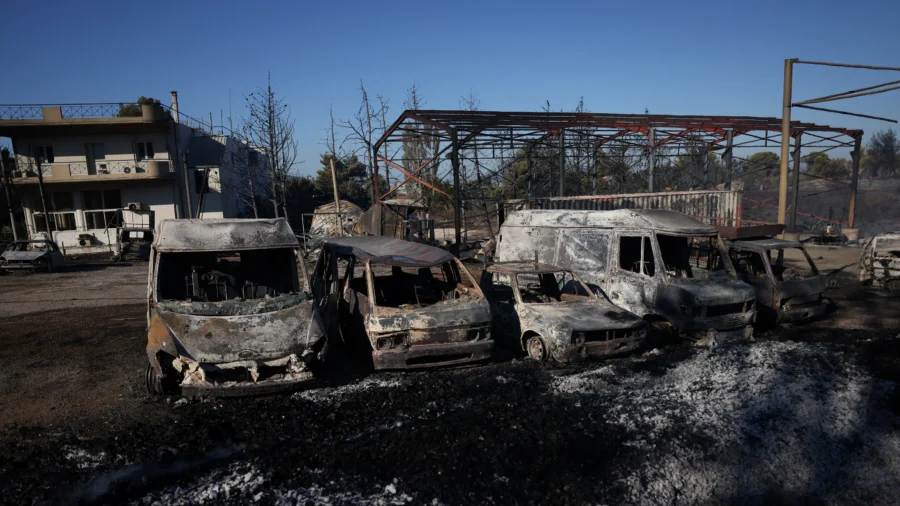ATHENS—Greece’s worst wildfire of the year killed one woman and continued to burn on the outskirts of the capital Athens on Tuesday, although lighter winds and firefighting efforts helped reduce its intensity, authorities said.
Hundreds of firefighters backed by six waterbombing aircraft battled the blaze that broke out on Sunday near the village of Varnavas 35 km (20 miles) north of Athens.
Stoked by gale-force winds, the blaze leapt from a wooded, hilly area into the suburbs on Monday, torching homes and stirring panic in neighbourhoods that had not seen such a fire so close to the centre in decades.
It reached Vrilissia, around 14 km (8 miles) from central Athens, a day ago, where a 64-year-woman was found dead inside a factory, witnesses said on Tuesday.
“Thirty-five years living here, a fire had never reached this area,” said Meletis Makris, a 65-year-old pensioner in Vrilissia.
The cause of the wildfire was not yet determined.
Pockets of fire remained around northern Athens, but the fierce blazes seen on Monday had subsided and the thick smoke that covered central Athens had mostly lifted.
“There is no active front, but scattered outbreaks,” Climate Crisis and Civil Protection Minister Vassilis Kikilias said in a televised statement.
However, gales were expected to pick up again later on Tuesday and the country will remain on high fire alert until Thursday, with strong winds and temperatures forecast to reach up to 40 degrees Celsius (104 degrees Fahrenheit).
“The overall picture looks improved but there are still many fronts in various areas,” said a fire brigade official.
Wildfires have been a common feature of Greek summers for years—its deadliest wildfire killed 104 people in the seaside town of Mati, near the capital, in 2018.
The southern European country experienced its warmest winter on record this year and was on track for its hottest summer, with scant rain in many areas for months.
“The wildfire had all the characteristics that we, as firefighters, don’t want a forest fire to have. A combination of hot, dry and windy (conditions),” Nikos Lavranos, head of the Greek federation of fire service employees, told Greek TV.
“It was extremely aggressive, difficult to manage and unpredictable,” he said.
The heatwave in Greece was mirrored across southern Europe, including in Spain and the Balkans.
“Nothing Left”
Residents and firefighters were able to return to some areas of northern Athens on Tuesday to assess the damage—kitchens and living rooms blackened by fire, ceilings caved in, cars reduced to sooty frames.
Local newspaper Proto Thema said the damage spanned 100 square kilometres (39 square miles) and included 100 homes.
“My house was utterly destroyed, even the walls fell down. There’s nothing left,” said Sakis Morfis, 70, a Vrilissia resident.
“There is nothing left. There’s no morale, no courage, there’s no money anymore, everything was destroyed…The only thing I cared about was saving my dogs, so I left everything (else) behind.”
Greece has activated the European Civil protection mechanism and is expecting assistance from France, Italy, and the Czech Republic with aircraft and firefighters. Spain and Turkey have also offered help.
More than 30 areas were forced to evacuate, along with at least three hospitals, with power cuts in parts of the wider Athens region. Passenger ferries heading to the port of Rafina northeast of the capital were diverted.
Police have helped evacuate more than 250 people, and some residents spent the night in shelters.

